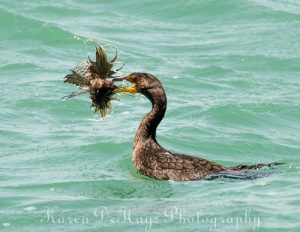
Cormorant with a lionfish
Do lionfish have predators? What eats lionfish in the Atlantic?
This is one of the most frequently asked questions that we hear. If lionfish are not a problem in the Indo-Pacific region why are their invasive populations expanding in the Atlantic, what eats lionfish over there in their home range? Unfortunately, because lionfish are NOT a problem in their native range, not much study had been done on them prior to the lionfish becoming an invasive species in the Atlantic. From our FAQ page, “Natural predators in the Indo-Pacific and Red Sea that are known to eat lionfish include sharks, cornetfish, grouper, large eels, frogfish and other scorpionfish. There is speculation that large snapper and some species of trigger fish eat lionfish in their native ranges as well.”

Sharks being trained to eat lionfish, widely considered a bad practice
Eating lionfish and being a predator of lionfish are very different
There are many animals that will eat a lionfish when it is wounded or being chased. I have shot at and missed a lionfish (yes, it happens occasionally) only to have a moray eel fly out of a nearby ledge and pounce on the fleeing lionfish. In this popular video a grouper in Cayman can be seen herding and eating a lionfish, but again this is not natural predation because the grouper has been trained by being fed lionfish and still has a human there (with camera) giving an assist to the grouper. Many photos have been taken of sharks, grouper, and mutton snapper being fed speared lionfish also. In Cozumel, I have seen giant mutton snapper follow us like puppy dogs looking for a hand out of speared lionfish, and trigger fish are also known to go berserk and pick away on a wounded lionfish. But these are all examples of opportunistic feeding with human interaction and not true natural predation of lionfish.
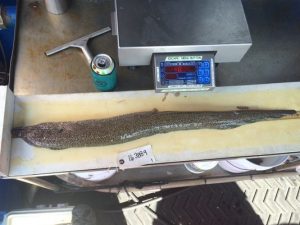
Spotted Moray eel that coughed up a lionfish
Moray eel eats lionfish
Recently Roldan Muñoz, a research fishery biologist for NOAA, published a paper documenting the discovery of a spotted Moray eel that was brought up far offshore of Jacksonville, FL that coughed up a lionfish when it landed on deck. This is the first verified example of natural predation of the invasive lionfish in the Atlantic Ocean because the Moray was found in an area where divers would not have been hunting. Munoz cautioned however, “The eel is not the panacea here…All I’m trying to say is we should potentially look into this in more detail…We don’t really have as good an understanding of how many eels are on reefs.”
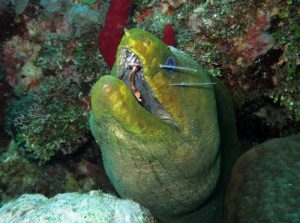
Moray eel with lionfish spines in mouth (Photo by ReefCI)
Does it hurt fish to eat venomous lionfish?
Great question, I’ve seen grown men cry from a lionfish sting so it’s no joke, how can other fish eat them without suffering? The best answer we’ve heard is that because fish are cold blooded the venom does not have as much effect as it does on a warm-blooded animal. For this same reason it has been shown that venomous snakes which feed on cold-blooded prey tend to have stronger venom than those eating warm-blooded food. It should be remembered that the lionfish does not use its venom to attack and harm, but rather it is purely for defensive purpose.
Invasive lionfish have one main predator
So, we’ve seen that there are other marine species out there eating the occasional lionfish, but to the question what eats lionfish, at the moment there is only one effective and proficient predator that is making a dent in the lionfish population and that is us, humans. We have shown through targeted removals we can make a difference by hunting lionfish, and until nature establishes its own equilibrium it will continue to be up to divers everywhere to keep the invasive lionfish in check.

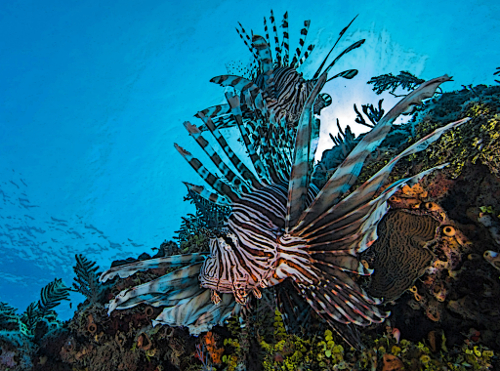
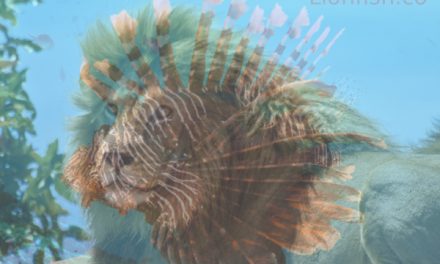


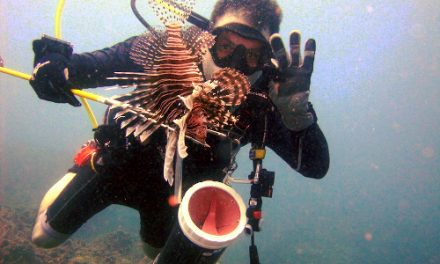

Thank you for this informative article. It has answered a question many of us have asked.
Hi I was wondering how sharks are being trained to kill lion fish?
Hi, We generally don’t recommend trying to train predators to eat lionfish because it really just teaches them to associate humans with a free meal. There hasn’t been any evidence that we can teach a shark to eat a healthy lionfish just by feeding it a dead or wounded one. If they are fed, it’s best to just leave the dead lionfish in the sand and not offer it directly to the predator so that it associates the meal with the human.
Thank you very much
Same principle as people feeding alligators.
Having spent most of the last couple of years SCUBA diving in the Caribbean, I have seen nurse sharks follow divers around expecting to be fed lionfish. They go so far as to flush lionfish out of hiding in the coral expecting divers to spear and then feed the fish to them. This indicates the nurse sharks understand divers will feed them lionfish specifically. I have seen a nurse shark eat a dying lionfish lying on the bottom after the lionfish was speared. The nurse sharks will pass a healthy lionfish right by, however.
I have watched divers feed the lionfish to reef sharks, barracuda, and moray eels too. Nurse sharks are the only predators I have seen follow divers for any length of time expecting to be fed. I have seen eels come out pretty aggressively when divers are collecting lionfish into zookeeper cylinders. They can smell the fish blood and will chase divers to get at the fish. Eels don’t see very well, but they have a keen sense of smell.
This lionfish is a real issue, cannot understand why the governaments are not doing anything about it, it is like they are waiting untill the whole emarine system rolls to shit than they will take millions of dollars to reinvent nature.
Everyone looks at fucken money, even YouTube wants to shut my channel off if I do not have enough retention from audience because there were reports that my channel is “cruel” to lionfish.
Help me by subscribing on my YouTube channel and spread my videos that show how to catch lionfish and handle this fish.
This is the link toy my channel https://www.youtube.com/channel/UCri4UzvkmV3iVEz5ZwZCIYA
You can also just type Golden Ratio 1.6180
How many lionfish do you catch in one hour and at what city do you catch them near?
It all depends, now I am in the Caribbean area, here these fish learned that humans are their predators and as soon as they spot un they “fly” not swim.
1 time I caught 13 in less than 40 min anther time I caught 15 in 5 hrs.
Free diving is the way to go here, scuba they will understand you are there and fly, here in the caribbeans the linfish got wise. Check and share my videos on youtube, and do not forget to subscribe.
From the videos you sill see (my progression) how calmly you have to approach them and a false movment (too fast or jercky) and they are gone. The funny thing is that those in florida stay put as pudding ready to be picked, even if you injure one and there is the another next to it they will not budje…
Thank you very much for your information, I am doing a persuasive essay in my composition class about killing lion fish, is it ok if I include your information?
Not at all buddy, you are welcome. You need more information do not hesitate, ask.
Actually there are some videos that I posted that not attentive people might not think more than “another fish being speared” but I am demonstrating the learning curve of this fish.
I the past they used to defend themselves but opening up their venomous spikes (even if cold blooded feel less their protein based venom) and just turn full frontal.
In some videos I showed CLEARLY that now with the new knowledge acquired with all of us hunting it, the lionfish is “compacting” (hiding) rather than expanding.
ALSO I noticed that when I speared a lionfish in a way that it understands that there is no more hiding, they swim versus me to try to bump me (as “they” understood that e spear them but do not touch them) SOMETHING TO THINK HUH.
Videos I took you might find pedagogically interesting
1 Hiding
2 Preparing to escape
3 Speared felt it has no chance and tried to bump me
4 Channel link
These are the links correspondent the above list. I own these videos and I give you the rights to use them as you need for education etc…
1 https://www.youtube.com/watch?v=giOeBNttqlY
2 https://www.youtube.com/watch?v=MH1PDyV06rQ
3 https://www.youtube.com/watch?v=FPst9UEDsJc
4 https://www.youtube.com/channel/UCri4UzvkmV3iVEz5ZwZCIYA/featured?disable_polymer=1
I also have videos on how to do after you catch them (to be safer to handle) and another video from catching it, making it safer, cleaning it and eating it. Check my videos. And if you can spread my channel because youtube is going to shit my channel because according to them my videos have been reported that are cruel towards fish. Their email was that if I do not have 1000 subs or 4000 views a month I will not be eligible to continue my channel monetization
Nice blog and great shots! I initially noticed your “cormorant vs lionfish” capture…. Fantastic! Wow, that looks like a big (aren’t lion fish quite poisonous?!)fish the bird has caught, but the potential meal doesn’t look too happy either!
So could the hungry cormorant really manage to fully consume that formidable-looking fish okay?? Does the lionfish put up a good fight, if somehow eaten, does the unlucky prey get swallowed wriggling all the way as well?!
-Kyle
Harbor seals are expanding their range further and further south off of Florida’s eastern shore. Is there any evidence to support seals preying on lionfish?
It’s very rare to have a harbor seal visit Florida. https://www.news4jax.com/weather/wayward-seal-ends-up-in-northeast-florida
human divers making a dent in lion fish population is laughable train seals to eat them . lol
so many Q’s A’d. doing a hunt later this year.
Since humans have to focus on the lionfish as a way of managing their numbers by spearing them one at a time down to depths of 30 meters, the fish have already done damage in order to get big enough to spear. Lionfish, however, can live much deeper than that. Even traps will not catch the small ones. I was wondering about the other end of the life cycle. Fish love to eat fish eggs. Have there been any studies on whether there are Caribbean fish that will eat the lionfish spawn? Getting rid of them before they hatch by being eaten by other fish would seem to me to be a more effective way to keep their numbers in check.